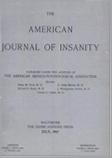CEREBRAL DAMAGE IN HYPOGLYCEMIA
Abstract
1. The literature on those studies describing cerebral damage in hypoglycemia is reviewed.
2. Four sources of material underly this study—namely, insulin shock in diabetics, spontaneous hypoglycemia secondary to neoplasm or functional overactivity of the islands of Langerhans, insulin shock therapy in mental disorders, and experimental hypoglycemia in animals.
3. Four personal cases are reported, three of whom are still alive but handicapped by varying neurological and psychiatric disabilities.
4. From a review of the literature and a study of our own cases it seems very apparent that continued repeated hypoglycemia may definitely produce a depression of the cerebral function and even an irreversible degeneration of the brain tissue and cells, resulting in long continued or permanent functional damage or even death.
5. The factors behind the different individual responses to hypoglycemic insults are at present unknown, hence making it impossible to predict or adequately control the more severe reactions or the resulting brain damage.
Access content
To read the fulltext, please use one of the options below to sign in or purchase access.- Personal login
- Institutional Login
- Sign in via OpenAthens
- Register for access
-
Please login/register if you wish to pair your device and check access availability.
Not a subscriber?
PsychiatryOnline subscription options offer access to the DSM-5 library, books, journals, CME, and patient resources. This all-in-one virtual library provides psychiatrists and mental health professionals with key resources for diagnosis, treatment, research, and professional development.
Need more help? PsychiatryOnline Customer Service may be reached by emailing [email protected] or by calling 800-368-5777 (in the U.S.) or 703-907-7322 (outside the U.S.).



